A Brief Colonial History Of Ceylon(SriLanka)
Sri Lanka: One Island Two Nations
A Brief Colonial History Of Ceylon(SriLanka)
Sri Lanka: One Island Two Nations
(Full Story)
Search This Blog
Back to 500BC.
==========================
Thiranjala Weerasinghe sj.- One Island Two Nations
?????????????????????????????????????????????????Monday, August 31, 2020
Decades on, Southern Mothers of the Disappeared Look for Truth, Justice and Relief
 |
| Add caption |
Today is International Day of the Victims of Enforced Disappearances.
“I am the luckiest mother in Sri Lanka. I got my son’s body back. There are thousands of mothers who never get their children’s bodies back.” Dr. Manorani Saravanamuttu was speaking after the inquest of her son, journalist and writer Richard de Zoysa, whose tortured body had washed up on a beach in Moratuwa in February 1990. Richard was dragged from home by armed men in the middle of the night.
He was one of the many thousands of young men and women who were exterminated by extra judicial means during the United National Party government’s crackdown on Marxist rebels from 1988 to 1990. Figures range from between 30,000 and 60,000. Several thousands more disappeared and still have not been found. Mass graves are unearthed from time to time but these investigations have led nowhere, just like the many commissions of inquiry held into disappearances reaching as far back as 1971, the time of the first insurrection. Some of the reports are yet to be made public.
No one has been brought to justice for Richard’s murder with Ranil Wickremesinghe, then a Minister in the government of President Ranasinghe Premadasa, dismissing the killing as “suicide or something else.”
Dr Saravanamuttu went on to form the Mother’ Front and became a voice for the poorer, marginalised women and men who continued to search desperately for their missing children, shunted from pillar to post, only to meet with hostility and rejection.
One of the early supporters of the families of the disappeared was opposition Sri Lanka Freedom Party politician Mahinda Rajapaksa, then a champion of human rights who even went to the UN Human Rights Council in Geneva to plead their cause.
In a twist of irony, 20 years later in January 2010, under the watch of President Mahinda Rajapaksa, journalist Prageeth Eknaligoda disappeared on his way home. His wife Sandhya continues to demand answers as to his whereabouts. The government has sought to dismiss his disappearance by dispensing stories about his alleged sightings abroad. Although she was able to extract some information, investigations are now at a standstill and are not likely to be taken seriously under the new government. Sandhya is constantly vilified and threatened as she continues her quest.
The Mothers’ Front faded away after Dr. Saravanamuttu’s death but a similiar organisation that was also started in the 1990s, led by Britto Fernando, continues the struggle under the name Families of the Disappeared, which has about 2,500 members. Unlike their counterparts in the North and East who still cling to the hope of finding their relatives, most families in the South have agreed to accept death certificates and are now looking for compensation rather than truth and justice.
“Our main focus is now compensation. Although we would like to see truth and justice, we have no faith that this government will deliver it,” said Mr. Fernando, citing the withdrawal from the co-sponsorship of the Geneva resolutions as a sign of the future direction.
However, the Southern mothers still persist, telling their stories over and over again in the hope that someone will listen and relieve their anguish. Over the decades their hair has turned grey, their faces have become wrinkled and their bodies unsteady.
Six soldiers brandishing machine guns broke into Seetha Gamage’s home at midnight on November 15, 1988, and abducted her husband, 27-year-old H. L. Jayasundara, a field office on an estate in Galle. They said they were just going to talk to him. He was wearing only a sarong.
When she went to the camp, half a kilometre from her house, the next morning, the soldiers denied that they had taken her husband. Seetha kept vigil outside the camp every day until 10 pm.
At 23 years-old with a three year-old daughter to support and no help from her family, on some days Seetha could only feed her daughter and went hungry herself. She sold coconuts and green leaves to earn money.
She has visited many camps, made police reports, complained to government officials and told her story to multiple commissions without getting any answers. She even got involved in politics, canvassing from door-to-door and going on protest walks with Mahinda Rajapaksa, the only person she trusted to help her.
Seetha still continues to fight as the Galle District Coordinator of Families of the Disappeared. She brought families in the district together and now they are a source of support and encouragement for each other.
“I want justice and truth about what happened. I don’t blame the military today but I want the perpetrators to be held accountable and I want relief for my pain and loss,” she said.
H. Pabawathi’s son, 17-year-old Ajith Samantha Pushpakumara, was abducted more than 30 years ago in January 1989. He was beaten and taken by the Rathgama Police along with four other boys. At the time he was abducted, his parents were planning for him to get married.
“I am looking for justice and the truth about what happened to my son. I also need compensation. I spend Rs. 5,000 each month on medicines, tests and hospital visits because I suffer from high blood pressure and cholesterol,” Pabawathi said, hugging her son’s framed photograph and wiping the tears from her eyes.
Pabawathi, who has marched alongside Mahinda Rajapaksa demanding justice for the families of the disappeared, has visited the Rathgama police station, the Boossa army camp and the Anuradhapura army camp but she and the other mothers who went with her were abused and chased away. They filed a case in a Colombo court but the perpetrators never appeared.
Her parents died because of the pain and suffering they endured after her son was taken. Pabawathi also lost her husband to the tsunami. The youngest of her three daughters takes care of her. She earns a small income from peeling coconut fronds.
This is Seetha’s story.
Tamil families of disappeared rally across North-East
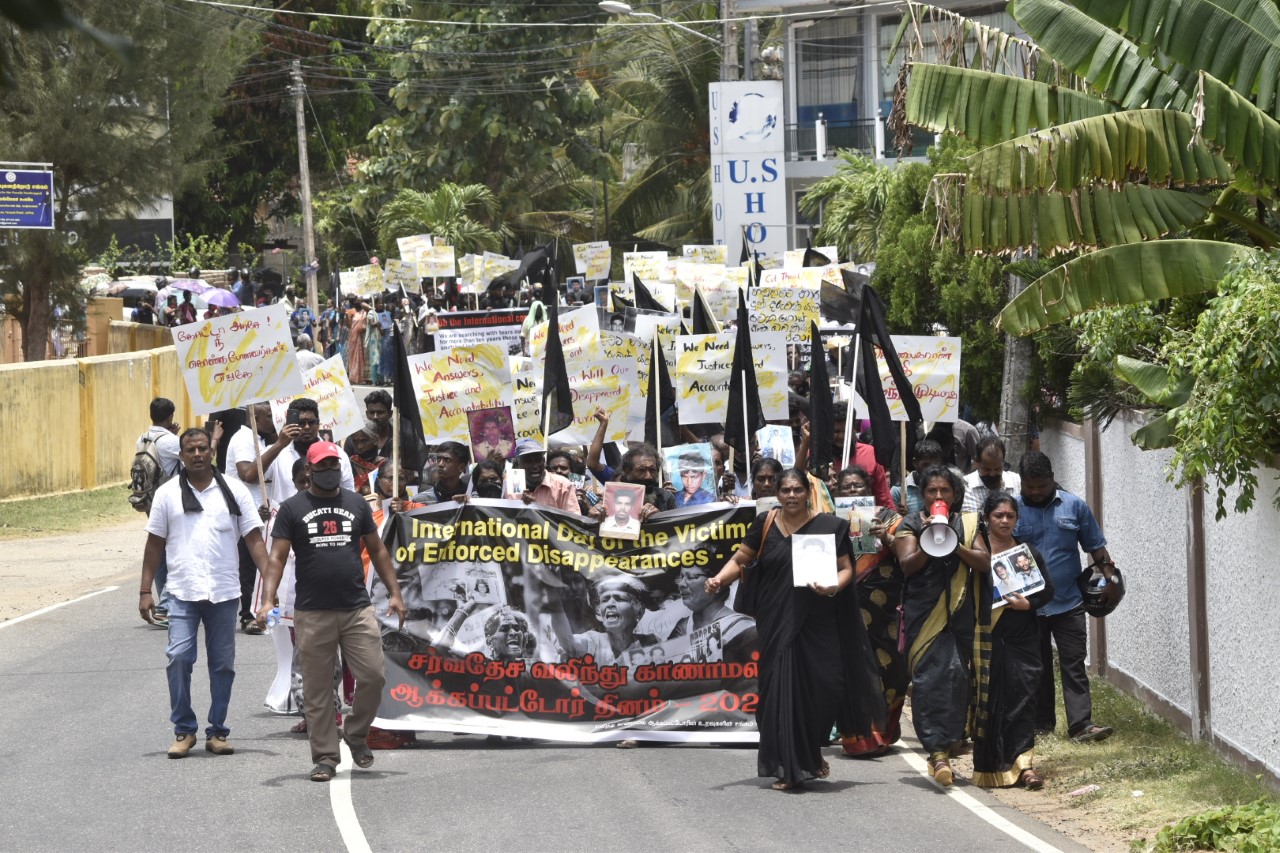 |
30 August 2020
Tamil families of the disappeared rallied across the North-East today to mark International Day of the Victims of Enforced Disappearances. Families demonstrated in districts across the Tamil homeland and were joined by members of the public and Tamil politicians.
Relatives of the forcibly disappeared have been protesting on the streets across the North East for 1,289 days, demanding to know the whereabouts of their loved ones. It is estimated that between 60,000 -100,000 people were forcibly disappeared from the 1980's until the end of the armed conflict in 2009.
Despite various government pledges and mechanisms, the search for their loved ones continues.
Jaffna
Despite the heavy presence of the Sri Lankan police, hundreds of protesters marched through Jaffna town carrying placards that read "We do not accept the OMP" and "How can death certificate be issued for the people handed over alive?"
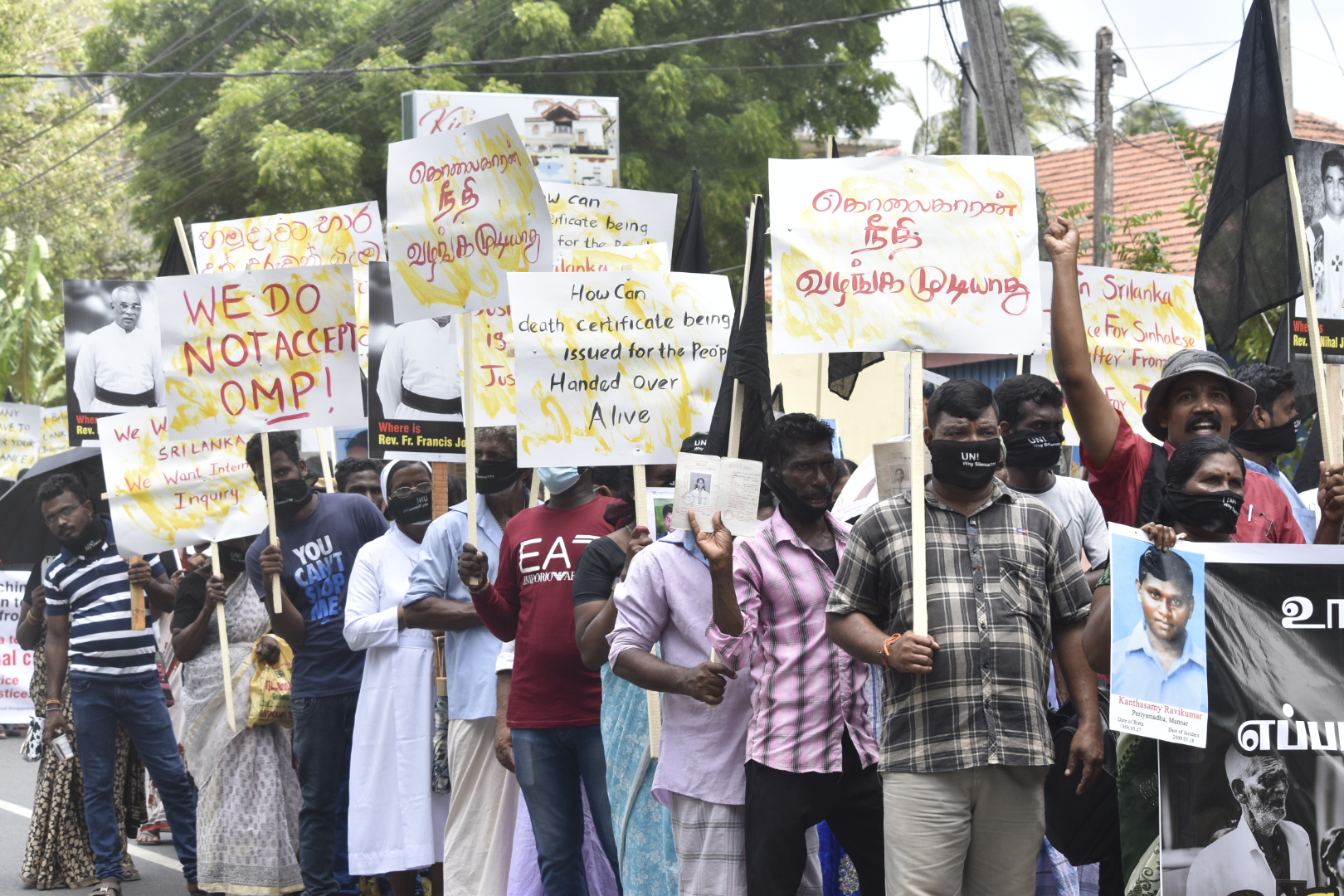 |
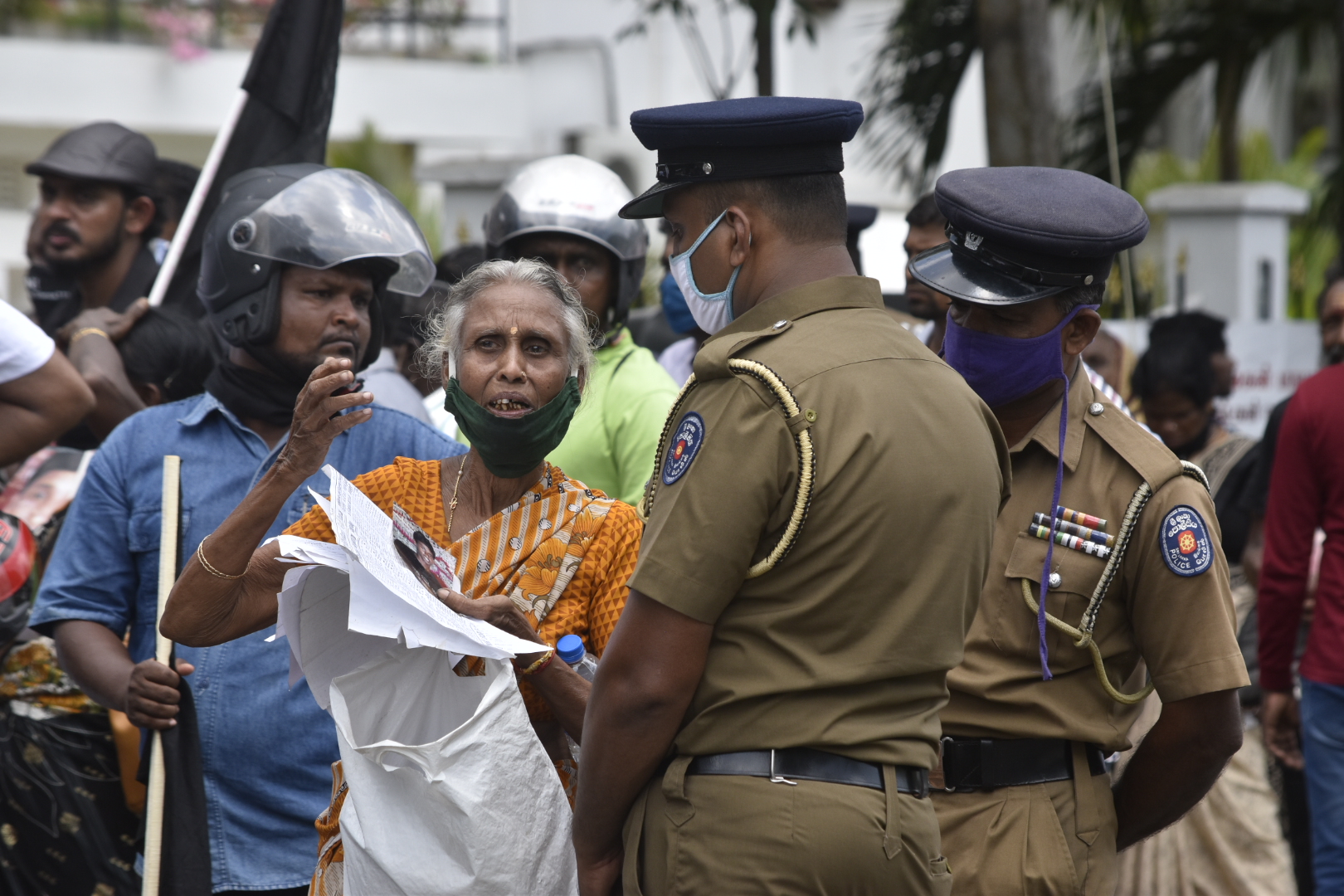 |
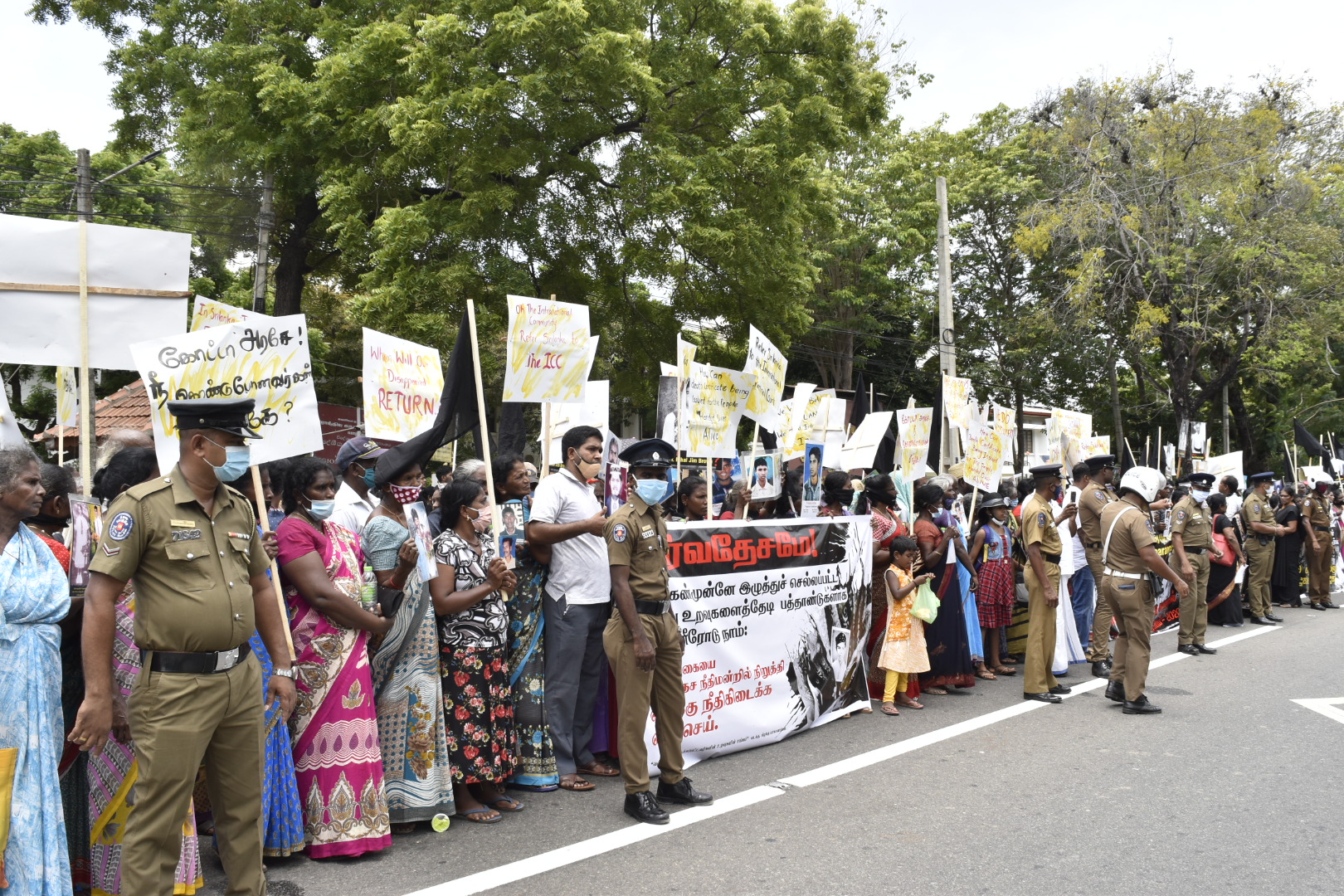 |
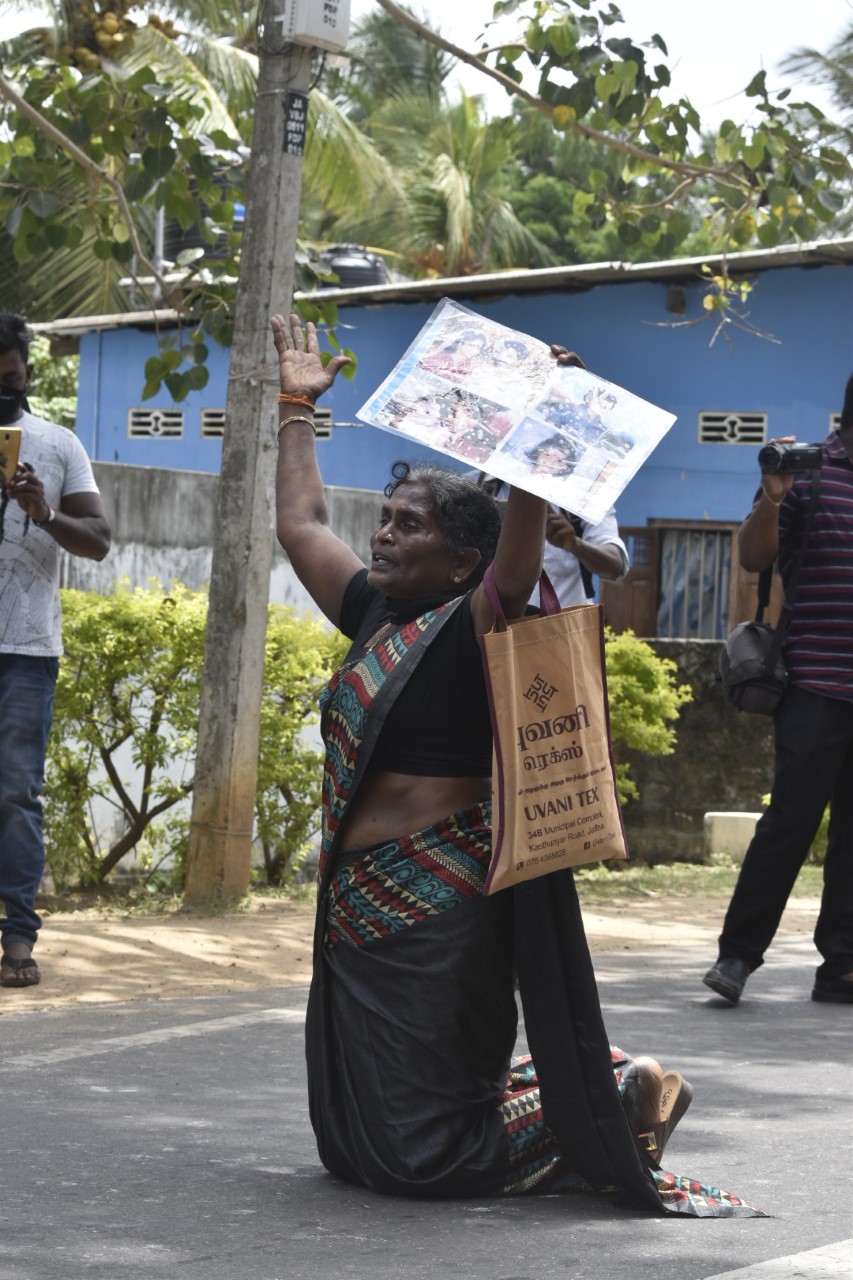
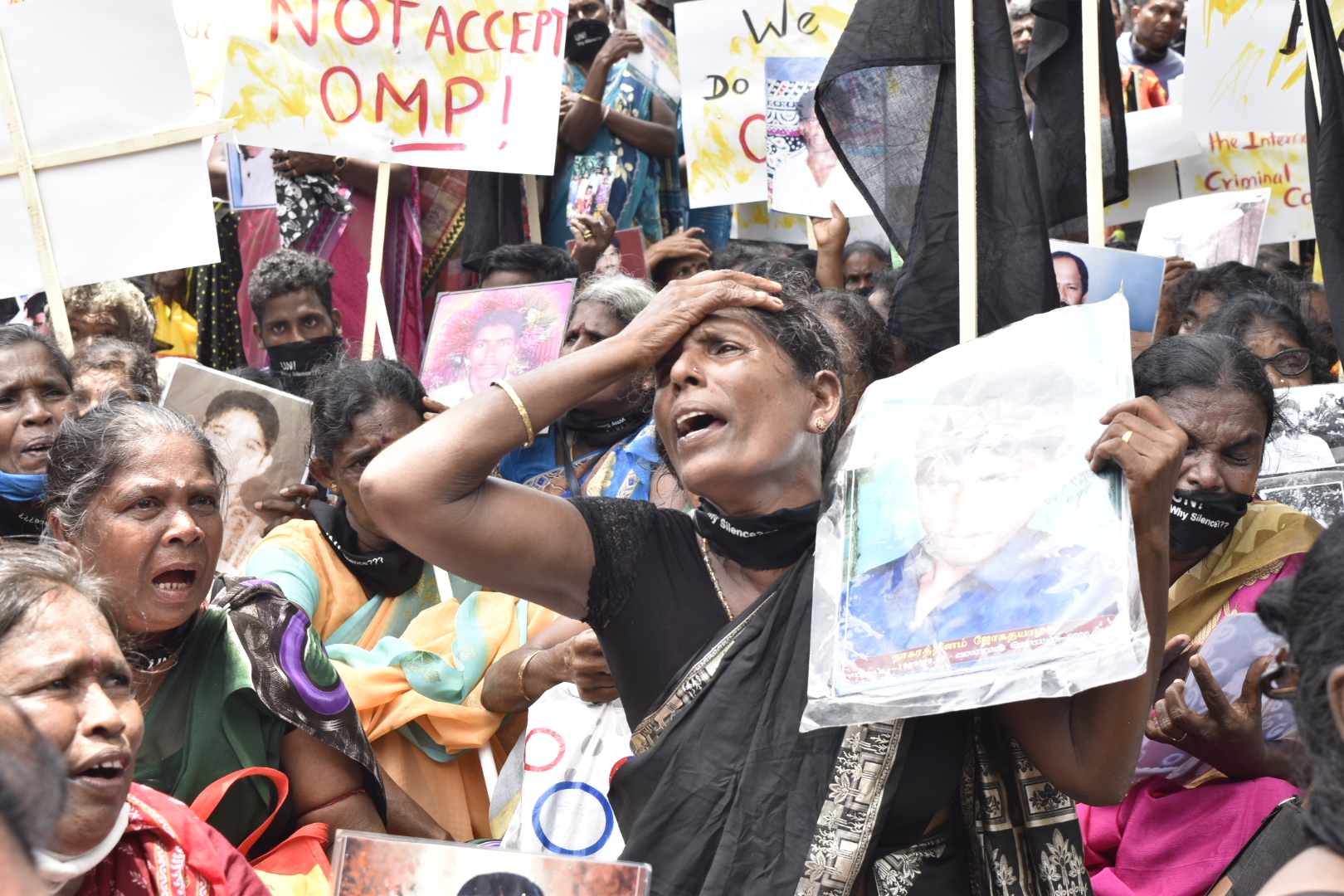 |
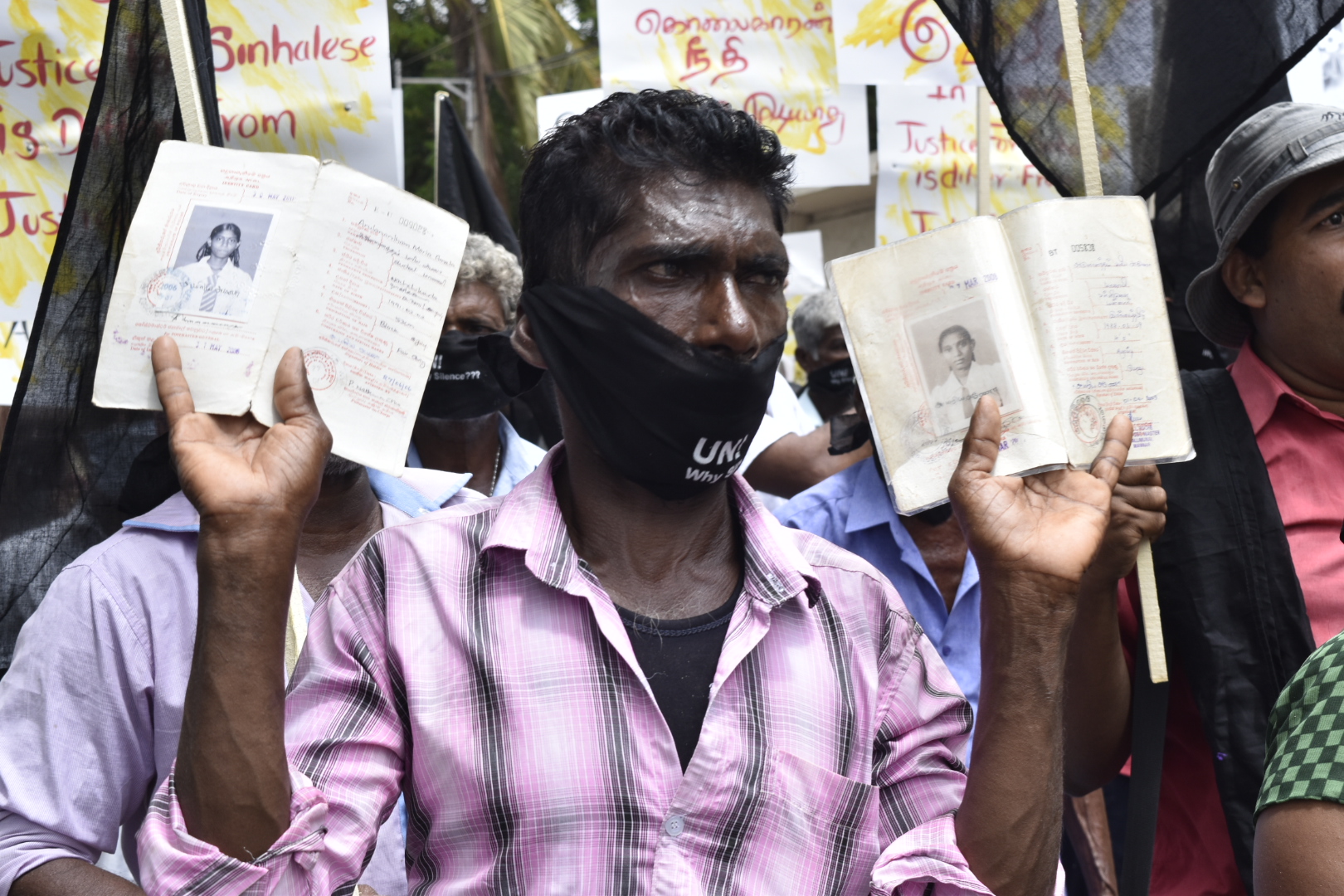 |
Batticaloa
Protesters marched through Kallady bridge to Gandhi Park despite a court order imposed by the Sri Lankan police in an attempt to ban the protest from going ahead. TNA Batticaloa district parliamentarians and religious leaders also joined the march.
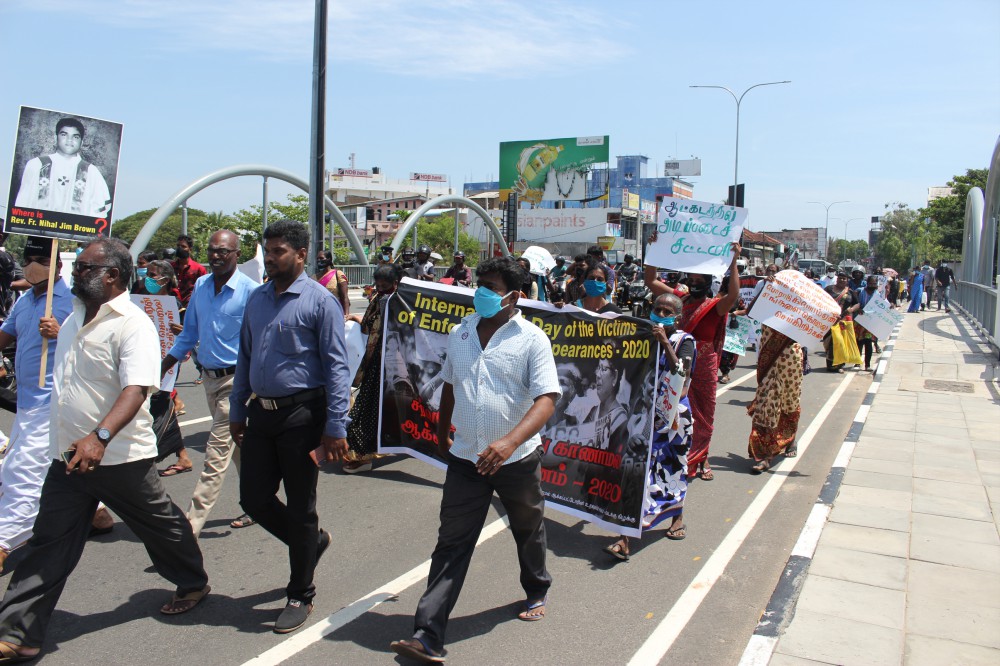 |
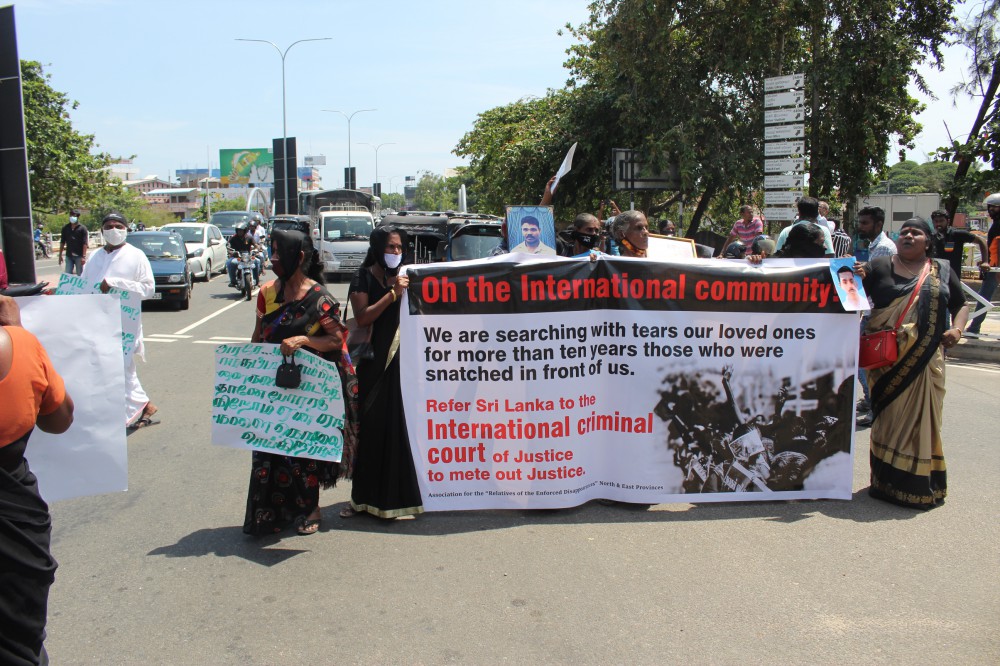 |
| Add caption |
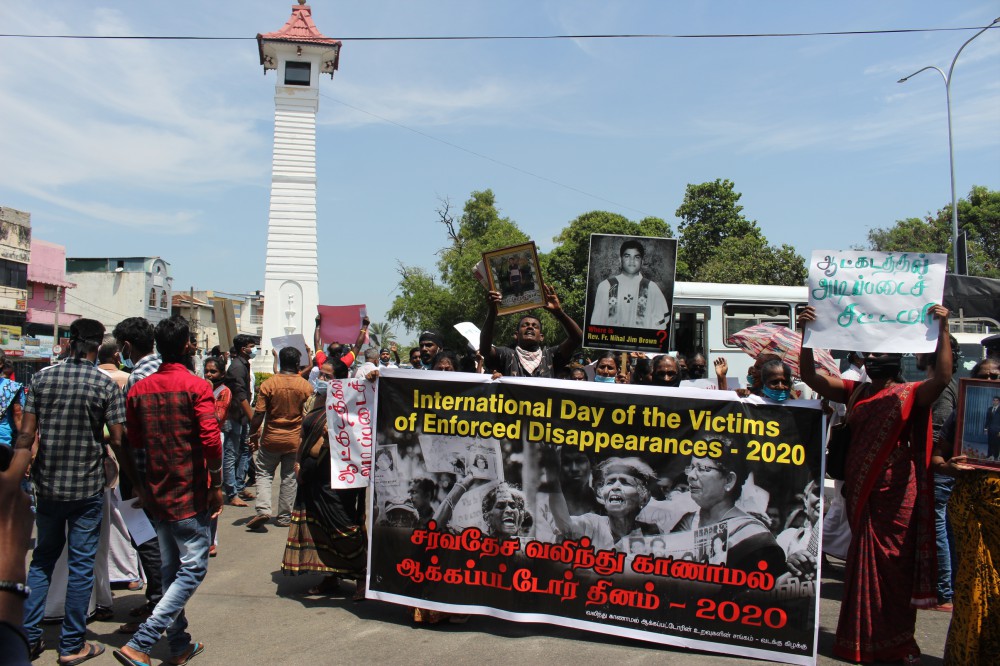 |
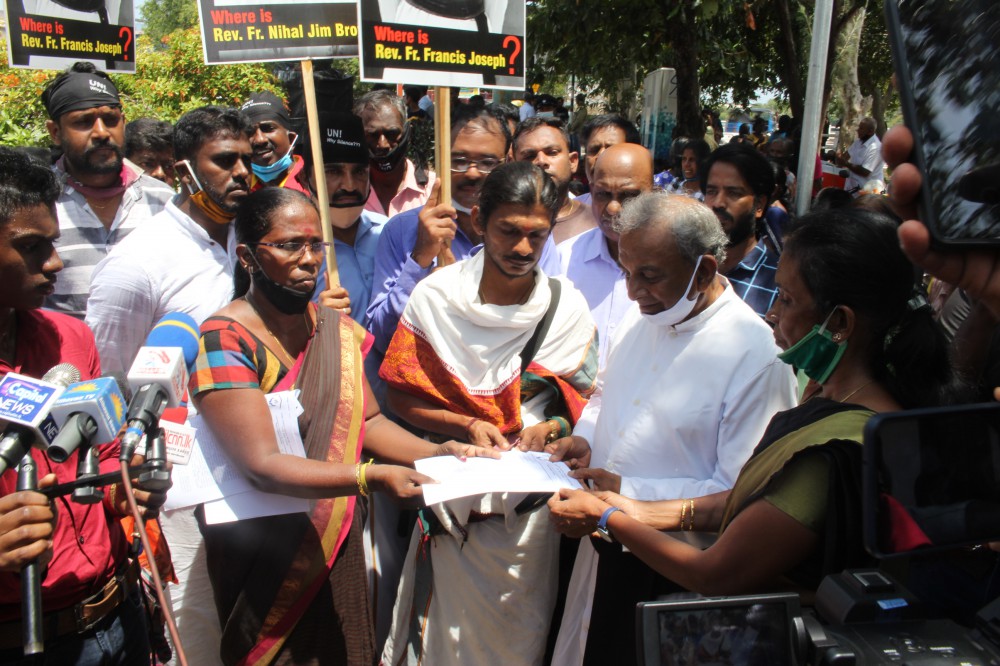 |
Vavuniya
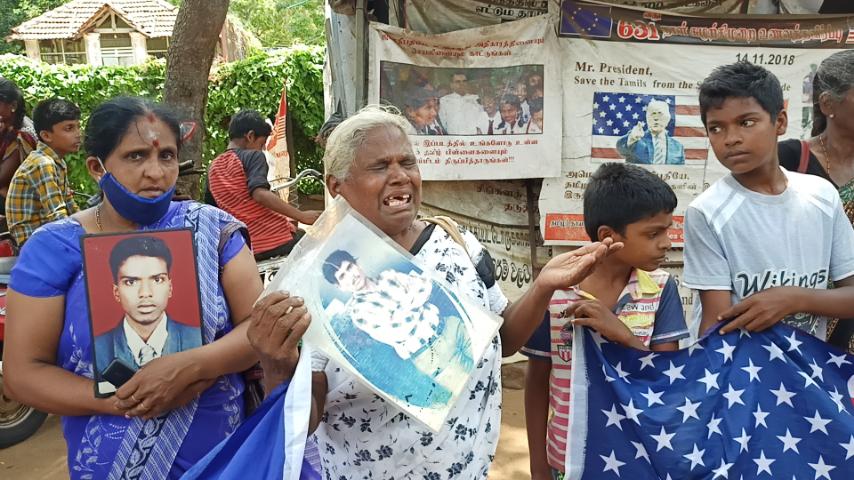 |
At the rally in Vavuniya, banners had slogans calling on the international community to "save the Tamils" from the Sri Lankan government.
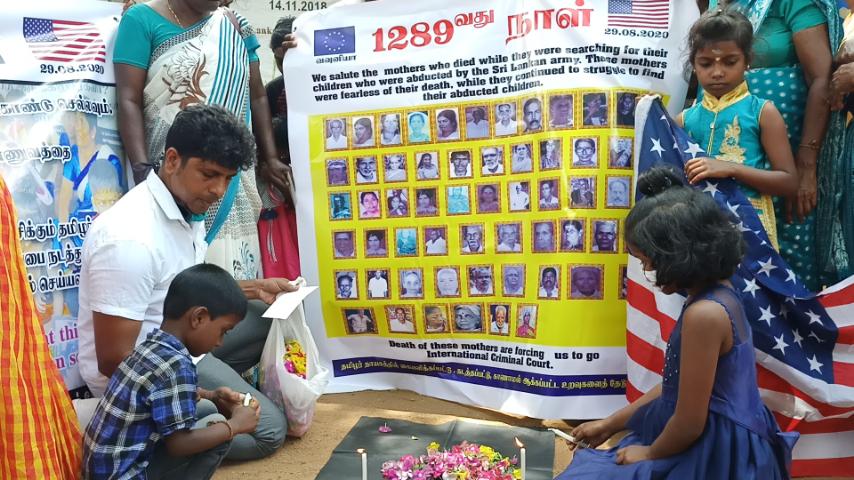 |
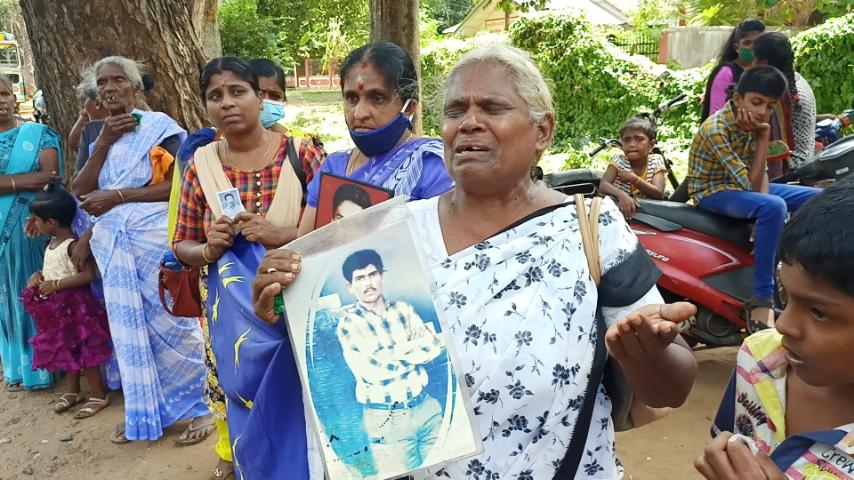 |
Mullaitivu
Families of the disappeared in Mullaitivu marched to mark the day.
The attention grabbing protest march waved banners saying ‘We reject the Office for the Missing persons’, ‘An International impartial inquiry is needed to find the missing’, ‘Abolish the prevention of Terrorism Act’, ‘International justice must be served’ and ‘An international investigation should be conducted through the International Criminal Court’.
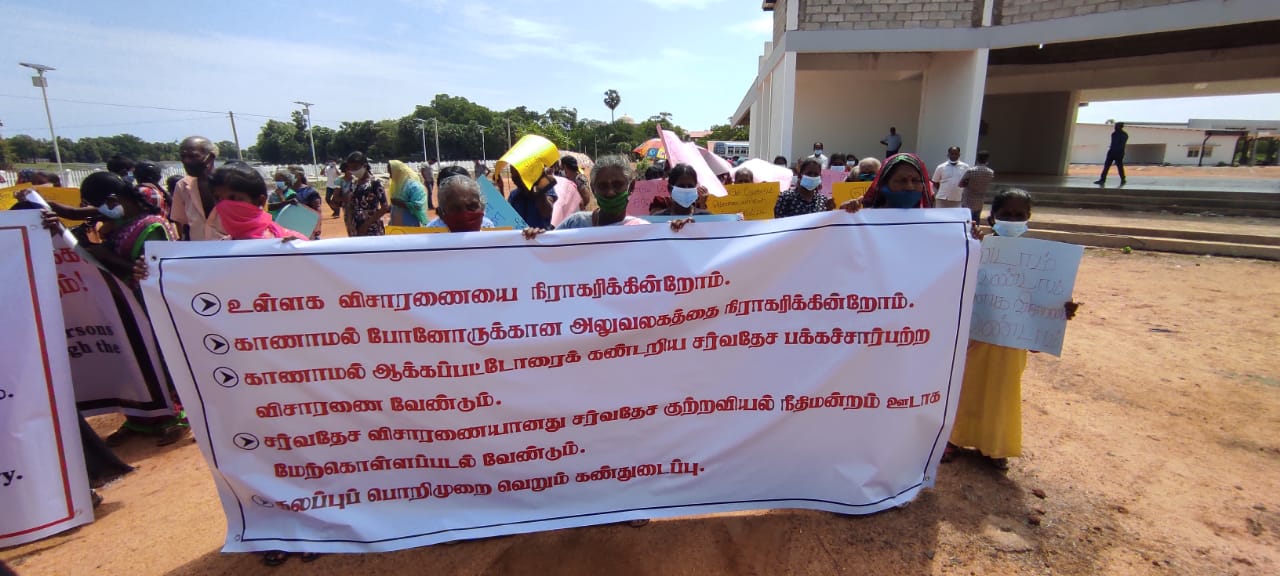 |
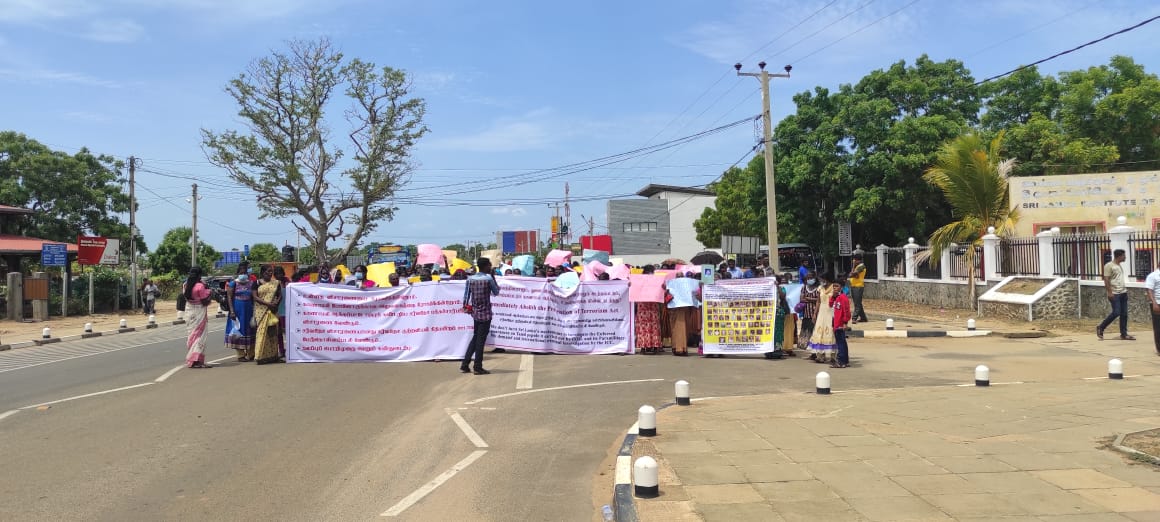 |
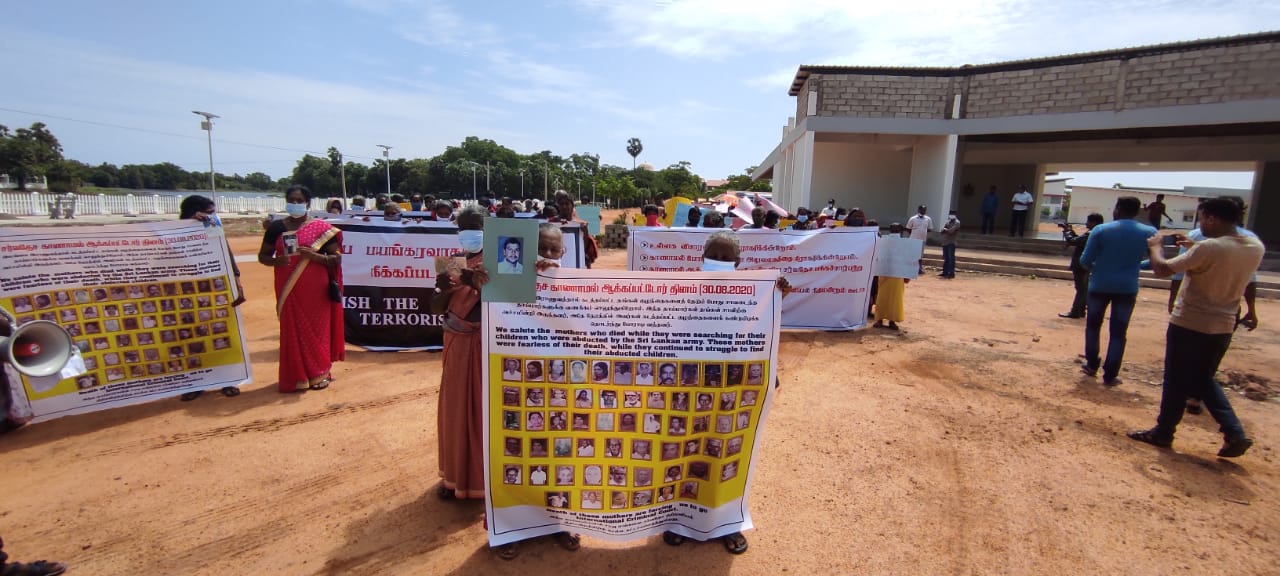 |
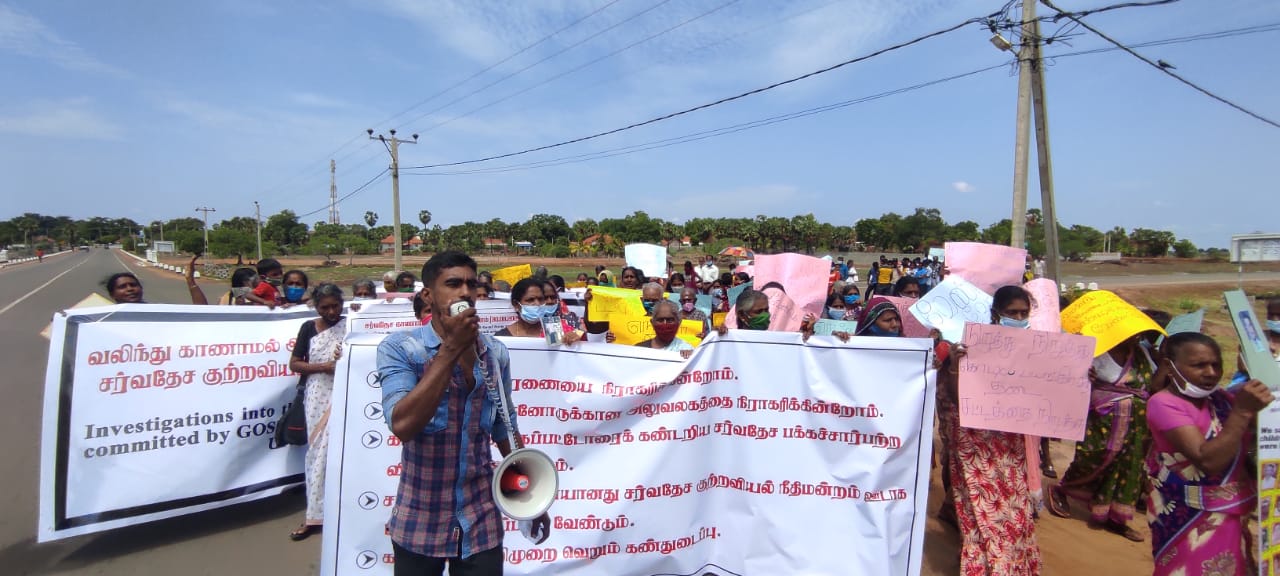 |
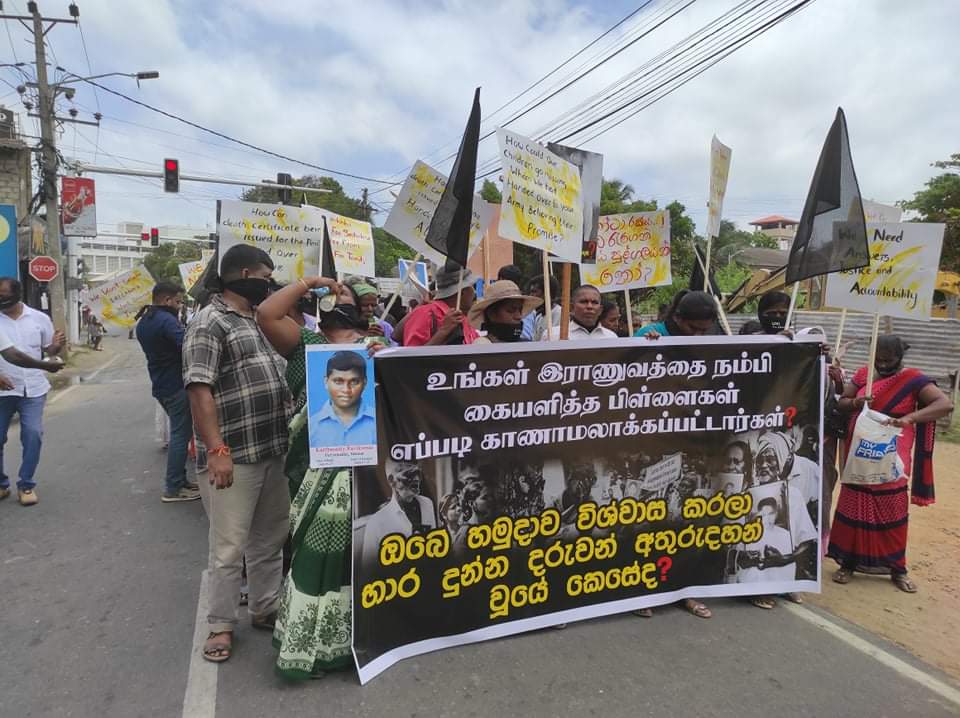 |
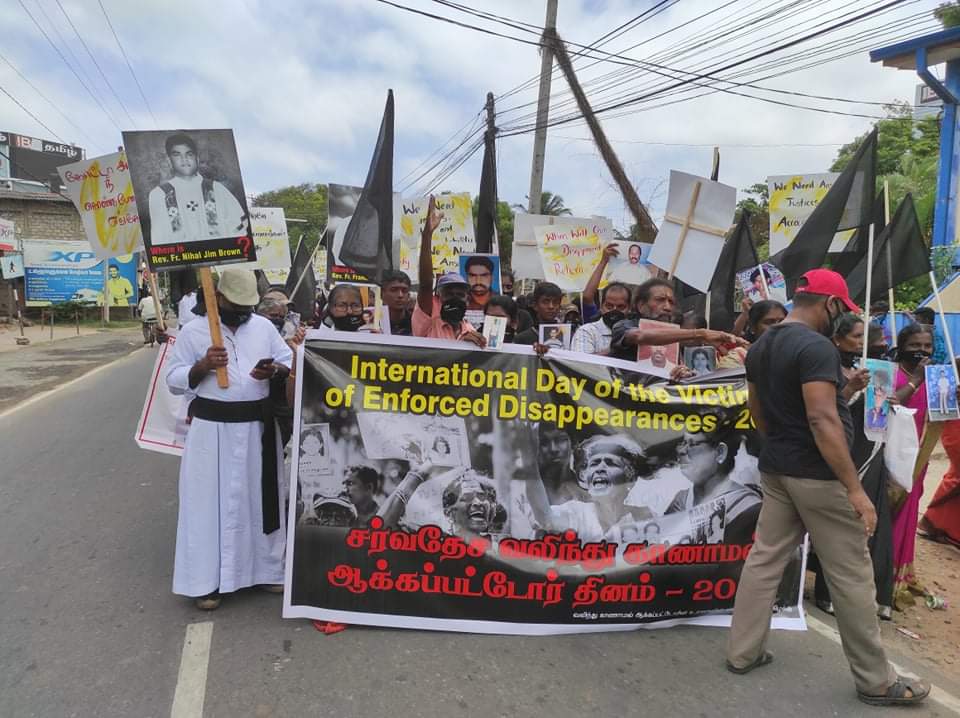 |
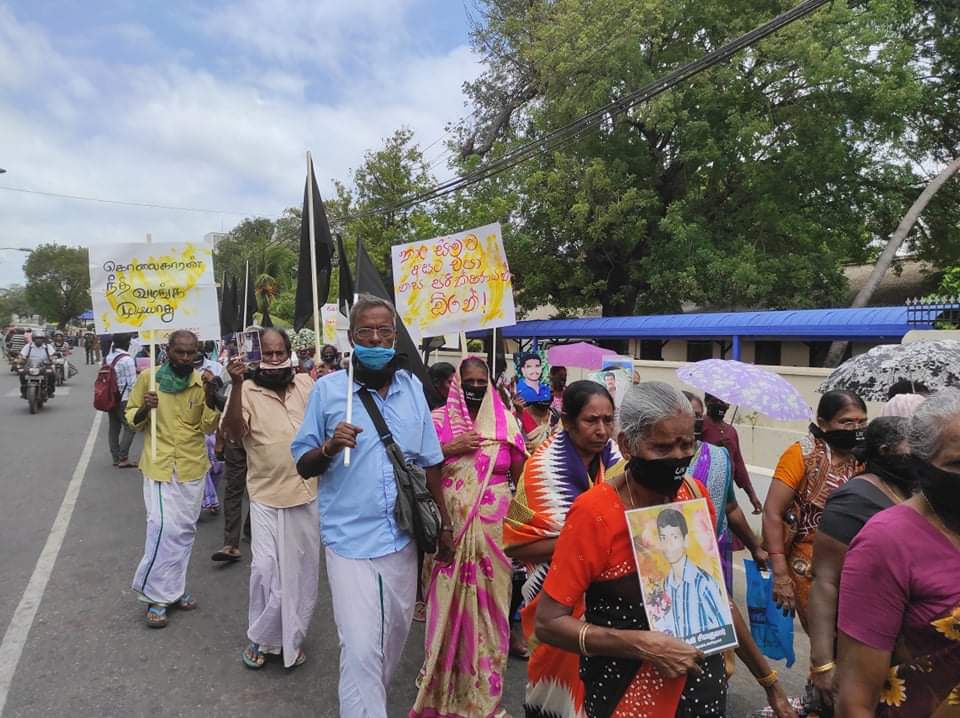 |
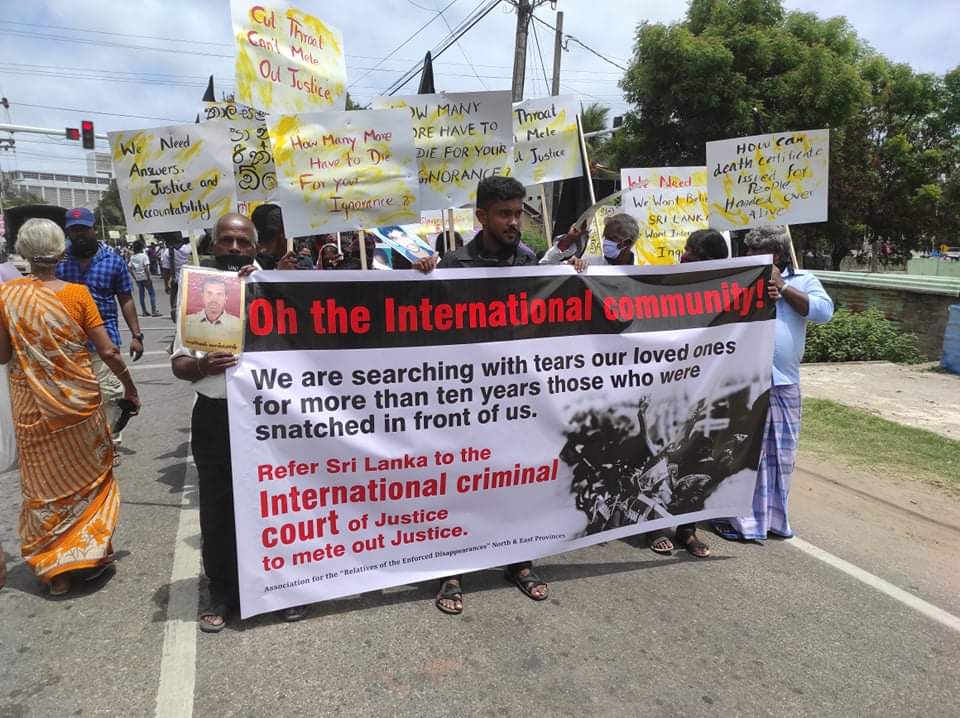 |
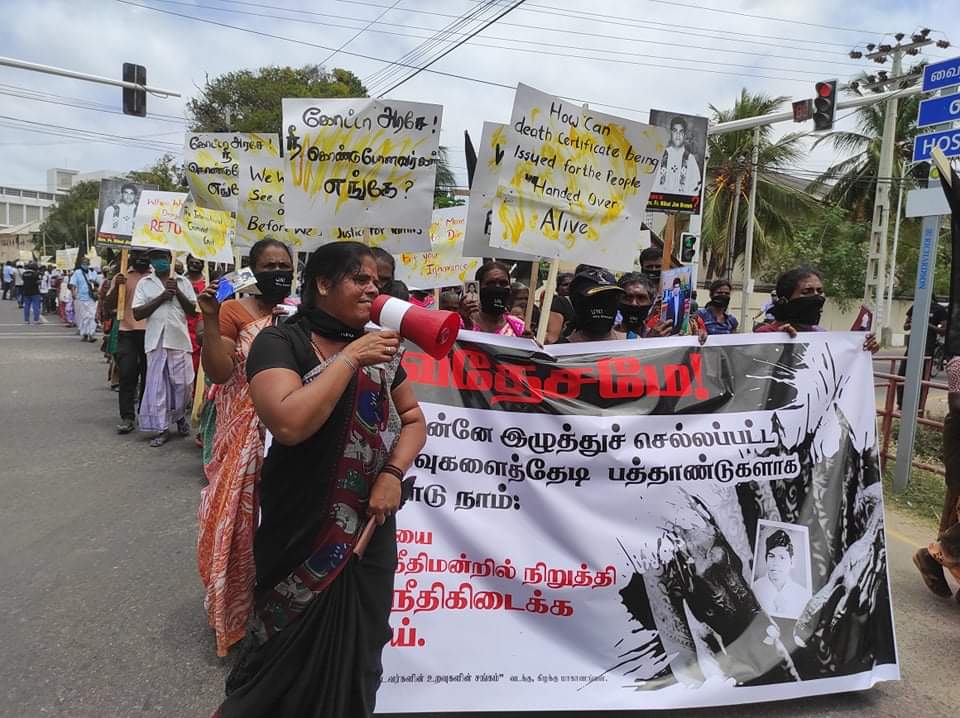 |
Related Articles:
By Kishali Pinto-Jayawardena –AUGUST 30, 2020
![]() The recent finding of criminal contempt against prominent advocate Prashant Bhushan by a Bench of the Indian Supreme Court has a ‘chilling effect’, a term used authoritatively by the Warren Court to protect First Amendment rights of speech and expression in the United States, beyond India. It has grave resonance in countries like Sri Lanka which have a history of stifling dissent through the device of contempt.
The recent finding of criminal contempt against prominent advocate Prashant Bhushan by a Bench of the Indian Supreme Court has a ‘chilling effect’, a term used authoritatively by the Warren Court to protect First Amendment rights of speech and expression in the United States, beyond India. It has grave resonance in countries like Sri Lanka which have a history of stifling dissent through the device of contempt.
Bhushan was found guilty of ‘scandalising the court’ on a suo motu consideration of two tweets, the first highlighting the Chief Justice of India (CJI) riding a motorcycle belonging to a politician of the ruling party and without wearing a mask while the Court remained on covid-19 lockdown for more than three months. His second tweet reflected on the collusion of the Court in destroying democracy in India during the last six years, ‘even without the formal declaration of an Emergency’ and the role of the last four CJIs in that regard.
The news was received with incredulity in Colombo primarily due to our bewildered wonderment as to why and how tweets, generally thought to be the medium of less intelligible conversation, could be adjudged of such awful impact by the Indian Supreme Court as to ‘shake the very foundation of constitutional democracy.’ But as the initial amazement subsided, serious questions began to be asked regarding the substantive impact of this ruling.
Justifiably alarmed, lawyers in India are calling for repeal of criminal defamation and contempt laws, arguing that these stem from colonial legacies criminalising dissent. These discussions are of great interest in Sri Lanka. Sri Lanka repealed criminal defamation provisions in the Penal Code in 2002 after protests by media and civil society over arbitrary convictions of senior editors who had incurred the displeasure of the Government.
On contempt, we have pressed for a law prescribing inter alia that substantial prejudice must be caused to the administration of justice for contempt to ensue rather than what may be offensive to one or more individuals, even a Chief Justice as the case may be. Indeed, we had commonly cited Indian precedents to make our case, including the seminal Mulgaonkar case (1978) concerning citation of contempt against the Indian Express for criticism of decisions during the Emergency. In declining to proceed, Justice Krishna Iyer’s words for the majority were prescient; ‘Justice is not hubris; power is not petulance and prudence is not pusillanimity, especially when judges are themselves prosecutors and mercy is a mark of strength, not a whimper of weakness…’
Yet the Bhushan ruling sets that thinking awry. Despite enacted law limiting judicial discretion and using its constitutional power to move in contempt, the Bench seems to have concluded that Bhushan had leveled a “malicious, scurrilous, calculated attack” with extraordinary ease, distinguishing the Mulgaonkar principles as not applicable. Bhushan’s defence that he had critiqued individual judges and not the administration of justice was dismissed on the basis that the tweets were directed against the institution of the Court and the Office of the Chief Justice. The Bench remarked that twitter is used by millions of people and that the impact of his tweets was considerable. If this reasoning is adopted elsewhere in the region, twitter users who robustly comment on the conduct of judges will need to beware. There will not be only a ‘chilling effect’ but a positively freezing inhibition on public scrutiny of the judiciary.
Of equally grave note is the Court’s stopping the Attorney General in his tracks during the hearing when the Attorney General attempted to establish that not only Bhushan but even judges of the Supreme Court itself had made adverse remarks in regard to the Court. This is not reassuring at all.
Indeed, there is a sense of anguish as I watch the outrage over this case across the Palk Straits. We have also asked that familiar question; where does a citizen treated unjustly go for redress when the Supreme Court itself commits the injustice? On one occasion, a Chief Justice of Sri Lanka with unprecedented political controversy swirling around himself, sentenced a lay litigant to one year rigorous imprisonment for speaking loudly in Court while reading the provisions of the Constitution out loud. Having no scope for review since this was the Chief Justice, I took the case to a committee of international jurists on the individual communications procedure under the Optional Protocol to the International Covenant on Civil and Political Rights.
As Sri Lanka had ratified the Protocol, resort to that procedure was possible when the apex court is alleged to infringe the Covenant. The committee decided (Fernando vs State of Sri Lanka, Contempt of Court, Communication No 1189/2003, 31, March, 2005); that the Court had overeached its authority, concluding that both the process followed and the finding of contempt violated international law. But to go beyond one’s own judiciary to plead for relief is no happy circumstance.
Read More
Political gimmickry and other influences slow investigation of Easter Sunday bombings
 |
by Tassie Seneviratne-August 30, 2020
In the Easter Sunday (April 21, 2019) bombings in Colombo, Negombo and Batticaloa. Police investigations under the criminal law and procedure were commenced with immediate effect. The results were very salutary. There was no chance left to the Executive to interfere. By April 25, as many as 40 suspects were taken to custody.
The co-ordinated attacks in Colombo, Negombo and Batticaloa, revealed that there had been a conspiracy. Investigations also revealed that a radical Islamic group by the name ‘National Thowheed Jamath’ (NTJ), led by Zaharan Hashim, was responsible for the attacks.
Valuable information has been supplied about this radical group by the Secretary of ‘Sri Lanka Thowheed Jamath (SLTJ) which is distinct from the NTJ. The Secretary SLTJ, Abdul Razik, has further stated that he had passed information to the Intelligence Services about Zaharans ‘change of ideologies’ since 2016 when Zaharan left the Muslim community. Several others of the Muslim community too have testified to have been in the know of these developments and information was passed on to relevant authorities.
Former Director of State Intelligence Service, Nilantha Jayawardena, has revealed that he received information 17 days prior to the attacks and that notices were issued to 14 VIPs that included the IG Police, Defence Secretaries, President Srisena and Prime Minister Ranil Wickremesinghe.
The Inspector General of Police has no excuse whatsoever for not immediately co-ordinating appropriate action to prevent the bomb attacks. He is the first in line, first for criminal negligence. What the investigation into the conspiracy would unfold is left to be seen if a proper investigation is carried out; not that the inaction on the part of President Sirisena and Prime Minister Wickremesinghe, to whom notices had been sent by the Director of State Intelligence Service, can be overlooked.
The information was specific in all aspects, even to the extent that the plan will positively be carried out, and the harm and damage to person and property will be catastrophic. There was no room to think that the attack may not take place.
It is not known however as to whether the criminal law procedure continued its regular course; nor even whether the police investigation has since been stalled. This question now arises since there is some other action being pursued by way of Parliamentary and Presidential Commissions on this matter. These entities have taken a form of quasi-criminal law procedure though not with the same competence the police investigation displayed.
Nor can this be expected from those without experience in investigating a case of this magnitude. Had they an understanding of the need for confidentiality essential especially in the investigation of a conspiracy, there would be no public drama broadcast on the evening TV shows. Witnesses who had earlier testified in the police investigation for judicial purposes, were examined by these Commissions. This drama may afford those responsible for criminal negligence and those involved in the conspiracy, an opportunity to cover their tracks.
Furthermore there is a possibility of confusion of evidence at the respective inquiries and such evidence may be conflicting and prejudicial to the court proceedings to be filed in due course. It is a matter of concern then that law and order may later be compromised by disregarding what the simple law lays down. And most importantly, is the conspiracy being properly investigated? Also, no room should be left for political interference in these matters.
Is it only criminal negligence that has to be investigated? There could have been a wider conspiracy of the kind we have read of in Agatha Christie’s detective novels – in this case – a real conspiracy by more people than meets the eye. Or, was it fear of reprisals from the ISIS that the information was passed around like ‘passing the pillow’? In fact the immediate belief was that it was the work of the ISIS. Having received the information, President Sirisena left the country just before ‘D-Day’. Prime Minister Wickremesinghe, to whom also the notice was sent by the Director State Intelligence Service, has made the excuse that he was kept out of Security Council meetings, and therefore could not initiate any action. Surely he should have asserted his position, especially in a situation of this magnitude. Could appointing Parliamentary and Presidential Commissions be red herrings that may impede the proper conclusion of the investigation?
If the Police is allowed to do their job of maintaining law and order, duly supported and not obstructed by the Executive, much more can be done in this sphere.
(The writer is a Retired Senior Superintendent of Police. He can be contacted at >seneviratnetz@gmail.com< )
PRECONDITIONS FOR SRI LANKA’S SUSTAINED ECONOMIC DEVELOPMENT – NIMAL SANDERATNE
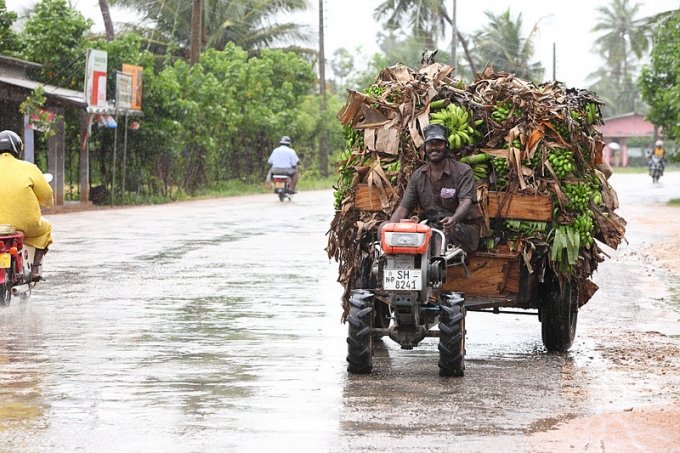 |
30/08/2020
Although the immediate task of the Government is to resolve the present economic crisis and stabilise the economy, people’s expectations are that the new Government with its massive mandate would navigate the economy from its current economic crisis to long term economic stability and growth.
Immediate tasks
The immediate macroeconomic tasks of the Government include the mitigation of the external financial vulnerability and reduction of the fiscal deficit that have been discussed in previous columns. The resolution of the recent increase in unemployment and depressed household incomes of a large proportion of low income households due to the global recession are urgent problems that have to be addressed immediately.
Focus
However, the focus of today’s column is the preconditions for long run sustainable economic and social development. The preconditions for long run sustained economic and social development include national unity, political stability, the rule of law, eradication of corruption, pragmatic economic policies and their effective implementation.
In retrospect
Our economic performance in the 72 years since independence has been much below our potential and expectations. Considering the country’s initial favourable conditions, the annual average economic growth of only about 4 percent in the last 70 years (1950-2020) has been disappointing. Countries in East Asia and South East Asia that were at a lower state of economic development and lesser per capita income have surpassed us by far. Last year we fell from a high middle income country to a low middle income country.
Inappropriate policies
The economic history of the country is replete with inappropriate and ineffective economic policies owing to ideological reasons. This is the vital difference of our economic policies and those of Singapore, Vietnam, Malaysia and other South East and East Asian countries and even Communist China. Regrettably there is still a strong ideological overhang that prevents us from adopting pragmatic economic policies and essential economic, administrative, educational and other reforms.
Human development
Nevertheless, the country’s social achievements are impressive. High life expectancy, low maternal and infant mortality, high literacy and school enrolment are significant achievements. The qualitative improvements in these too could have been enhanced if the economy performed better.
Prerequisites
The absence of several prerequisites for economic development hindered the country’s development. The absence of these non-economic preconditions was largely responsible for the country’s below potential economic performance. What then are the preconditions for Sri Lanka to achieve high sustained economic growth and human development?
Five preconditions
At least five preconditions are needed for the country to achieve economic development. These are a stable government committed to long run development of the country and ensuring the rule of law, achievement of ethnic religious and social harmony, eradication of corruption, sound and pragmatic economic policies and a certainty in their continuity and effective implementation.
Underlying reasons
The absence of these non-economic factors and effective pragmatic economic policies are underlying reasons for determining economic and social development. Admittedly, there are a number of other reasons too that influence economic development such as a people’s values, work ethic, education and the political culture and milieu.
National unity and social harmony
One of the key reasons for the country’s inability to achieve higher economic growth has been the periodic ethnic and religious violence. These episodes have deterred foreign investment, weakened the country’s economic capacity through waves of brain drain, increased defence expenditure, increased the fiscal deficit and public debt and destabilised the economy.
July ‘83
The clearest instance of this was the July ’83 violence at a moment in time when the economy was set to take off with significant foreign direct investments. This led to the severe setback to the economy till the end of the civil war in 2009.
Ethnic and religious harmony will be a determining factor in ensuring economic development in the future.
Political stability and rule of lawRule of Law
The massive mandate the SLPP received is once again an opportunity to ensure these preconditions for economic development. The stability of the Government for the next five years should give it a strong resolve to implement policies that are conducive for growth without implementing populist policies that derail the economy.
Law and order
Ensuring law and order and the rule of law is one of the most important preconditions for economic development. The rule of law means not only the enforcement of law to ensure peace and orderly life of the community, but also equal justice for all. Without these the economy will not take-off as the investment climate will not be conducive for foreign and domestic investment.
Eradication of corruption
The government must eradicate corruption and be above corruption. Corruption distorts economic and social priorities, wastes public resources and leads to inefficiencies that retard economic growth. It is well recognised that bribery and corruption have permeated all strata of the body politic and administration. Much of the success of the new government depends on achieving a relatively low level of corruption in the country.
Pragmatic economic policies
The Government must take a realistic view of the current state of the economy and adopt economic policies that are economically rational and pragmatic. Pragmatic policies are those that are effective. Ineffective economic policies based on any ideology could prove costly, as in the past. Economic reforms that are crucial for the country’s progress should be implemented without ideological considerations. The government must formulate pragmatic economic policies and not be guided by ideological policies.
Effective implementation
Admittedly, despite the government’s majority in parliament, it would find it difficult to implement these suggestions. The political culture and milieu and ambitions of politicians and vested and parochial interests may oppose needed political and economic reforms. That is why the country has remained underdeveloped and did not achieve her economic potential. Yet we must hope that there would be break from the past that would enable the preconditions for economic growth and development.
An efficient administration is crucial for effective implementation of policies. Administrative reforms to ensure an efficient public service is a priority. Despite a comprehensive Report of the Administrative Reforms Commission of many years ago, no reforms of substance have been implemented.
Summing up
Sustained high economic growth can be achieved only if several non-economic preconditions are established. These include national unity, political stability and the rule of law, and eradication of corruption. Pragmatic economic policies and their effective implementation and economic, educational and administrative reforms are vital to enhance the country’s economic efficiency. Unless these preconditions are established our economic development will continue to be below our potential.
Final word
Finally, it is worth reminding ourselves of the words of Demosthenes the Greek orator to the people of Athens: “Let us not be people who decide when we should discuss nor a people who discuss when we should decide.”
(Sunday Times)
How Sri Lanka Was Shortchanged By 13A
By C.A. Chandraprema –AUGUST 30, 2020
![]() The government has made an official statement to the effect that it’s reconsidering the 19th Amendment but no such official statement has been made with regard to the 13th Amendment. However opposition politicians have expressed the view that the government is trying to use their two thirds majority to do away with the 13th Amendment as well. The government does not have to take the trouble to do anything to get rid of the 13th Amendment. It has been tied up in knots by the yahapalana political parties including the Tamil National Alliance so effectively that all that the government has to do to get rid of it for good, is to do nothing. If the government is to restore the provincial councils system, they will need a two thirds majority to do away with the yahapalana government’s 2017 Act which sent the PC system into the limbo that it is in at present.
The government has made an official statement to the effect that it’s reconsidering the 19th Amendment but no such official statement has been made with regard to the 13th Amendment. However opposition politicians have expressed the view that the government is trying to use their two thirds majority to do away with the 13th Amendment as well. The government does not have to take the trouble to do anything to get rid of the 13th Amendment. It has been tied up in knots by the yahapalana political parties including the Tamil National Alliance so effectively that all that the government has to do to get rid of it for good, is to do nothing. If the government is to restore the provincial councils system, they will need a two thirds majority to do away with the yahapalana government’s 2017 Act which sent the PC system into the limbo that it is in at present.
When the provincial councils system was functioning there was the oft heard complaint that it had not been made fully functional i.e. that the police and land powers of the provincial councils had not been implemented as originally intended. This has been a major bone of contention during the past three decades with the Tamil National Alliance calling for its full implementation and even demanding that the Sri Lankan government should go beyond the 13th Amendment in order to satisfy Tamil aspirations. One thing that we have to realize is that like so many other aspects of the 1978 Constitution, the 13th Amendment is a very badly drafted piece of legislation. When police and land powers were included in the 13th Amendment, they were copied wholesale from the Indian constitution with no consideration for its practicability in Sri Lanka.
Land powers
In India, what has been said in the text of the Constitution in relation to the powers over land of the center and the states has been defined and interpreted by the Supreme Court. In the landmark 1962 case, State Of West Bengal vs Union of India, a majority judgement concluded that the structure of the Indian Union is centralized, with the States occupying a secondary position. Hence the Centre possessed the requisite powers to acquire properties belonging to States. The Indian SC observed in this case, that even under Constitutions which are truly federal and full sovereignty of the States is recognized, the power to utilise property of the State for Union purposes is not denied. Therefore the power of the Union to legislate in respect of property situated in the States remains unrestricted. This judgement was delivered in 1962. The provincial councils system was introduced in Sri Lanka in 1987. If the text dealing with land powers in the 13th Amendment had been formulated on the lines laid down in State of West Bengal vs Union of India, the Northern Tamil political parties would have had more realistic expectations with regard to powers over land. Instead, the text of the 13th Amendment on land powers followed the text of the Indian Constitution thus making it necessary for Sri Lanka to reinvent the wheel as it were.
In 2013, Sri Lanka finally got its own version of State Of West Bengal vs Union of India which defined the extent of the land powers mentioned in the 13th Amendment. The 2013 case of Solaimuthu Rasu, vs The State Plantations Corporation was heard by a three member bench of the Supreme Court made up of Chief Justice Mohan Pieris, K.Sripavan, and Eva Wanasundera and each judge delivered separate judgements while coming to the same conclusion. Justice K.Sripavan observed in his judgement that ‘land’ is a Provincial Council subject only to the extent set out in Appendix II (of the 9th schedule of the Constitution). The Constitutional limitations imposed by the legislature shows that in the exercise of its legislative powers, no exclusive power is vested in the Provincial Councils with regard to the subject of ‘land’… a Provincial Council can utilize ‘State Land’ only upon it being made available to it by the Government. It therefore implies that a Provincial Council cannot appropriate to itself without the government making state land available to such Council. Such state land can be made available by the Government only in respect of a Provincial Council subject.
Justice Sripavan explained further that the only power cast upon the Provincial Council is to administer, control and utilize such state land in accordance with the laws passed by Parliament and the statutes made by the Provincial Council… Even after the establishment of Provincial Councils in 1987, state land continued to be vested in the Republic and disposition could be carried out only in accordance with Article 33(d) of the Constitution read with 1:3 of Appendix II to the Ninth Schedule to the Constitution. Despite such Supreme Court interpretations given in India and Sri Lanka, the Tamil lobby in Sri Lanka continues to demand exclusive land powers that even Tamil Nadu does not possess. They may point to the text of the 13th Amendment, but never to the interpretations given to that text in India or even in Sri Lanka. People pretend that they have neither seen nor heard of any interpretation given with regard to land powers and we keep going round and round in circles.
Police powers
When it comes to police powers however, what the 13th Amendment has is what India actually has in practice. The first item on the Provincial Council List of powers is Police and Public order. The extent of these powers are set out in an Appendix to the 13th Amendment according to which the Sri Lanka police force was to be divided into a National Division (including Special Units) and nine Provincial Divisions. The National division would have jurisdiction only over 11 specified areas such as offences against the State, election offences, offences relating to currency, offences committed against a public officer, a judicial officer, or a Member of Parliament, offences relating to state property and international crimes etc. Other than such specified offences, all other day to day police work such as crimes, traffic, drugs, fraud and maintenance of public order etc. were to be carried out by the provincial police forces.
Thus what we were to have under the 13th Amendment were in effect nine different police forces combined with a national police force all crammed into an area the size of one of India’s smaller states. A police system designed for a sub-continent applied to a country only a little bigger than Himachal Pradesh. Furthermore the creation of separate police forces for each province would have given rise to a Tamil police force in the north, a Muslim and Tamil police force in the east and Sinhala police forces in the rest of the country – a sure recipe for disaster given Sri Lanka’s history of ethnic conflict. No leader in the past three decades since the 13th Amendment was passed has even considered implementing the police powers laid down in the 13th Amendment. Moreover, these police powers have been included in the 13th Amendment in a situation where some of the most important safeguards in the Indian Constitution against separatism have been left out of it.
The missing safeguards
Read More
Subscribe to:
Posts (Atom)







